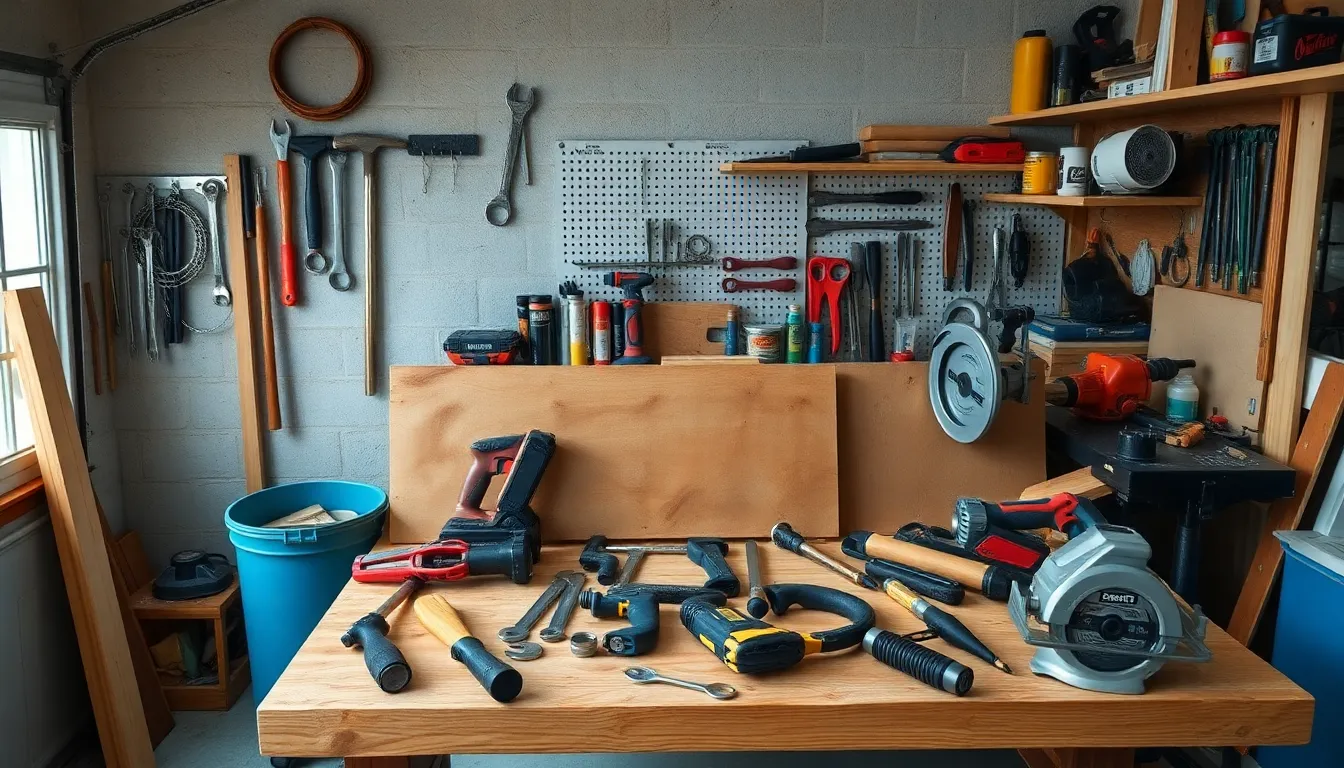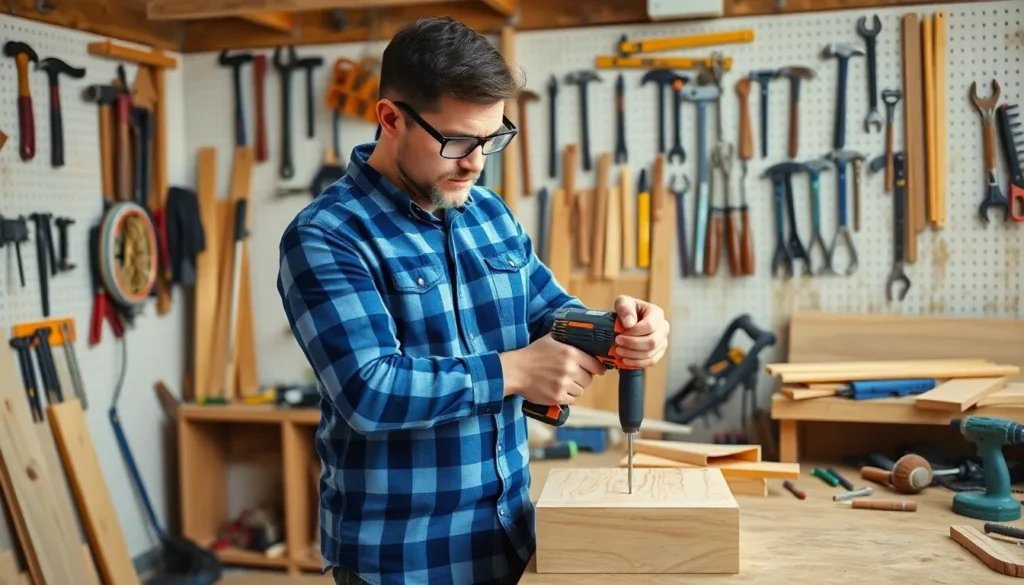Table of Contents
ToggleEvery DIY enthusiast knows the secret to transforming a house into a home workshop: the right tools. Whether it’s building that dream bookshelf or finally tackling the infamous “honey-do” list, the right gear can make all the difference. Imagine wielding a power drill like a magician with a wand, turning lumber into masterpieces with just a flick of the wrist.
Overview Of Home Workshop Tools
Home workshop tools provide the essential equipment needed for various DIY projects. A power drill stands as a versatile choice, capable of drilling holes and driving screws with ease. Hand tools like hammers and screwdrivers offer practicality for small tasks and furniture assembly.
Safety gear remains crucial when utilizing power tools. Gloves protect hands from sharp edges, while goggles safeguard eyes from debris. The combination of protective equipment with tools maximizes efficiency and safety in a workshop environment.
Woodworking tools, including saws and chisels, help create precise cuts and shapes necessary for custom furniture. Measuring tools, such as tape measures and squares, ensure accuracy during construction. Organizing these tools in a dedicated workspace fosters a productive environment.
In addition, power saws, including table and miter saws, facilitate complicated cuts and increase project speed. A workbench provides stability for crafting, allowing proper handling of materials.
Investment in quality tools yields long-term benefits, including durability and better performance. Considering the specific needs of each project guides the selection process.
For outdoor woodworking tasks, cordless tools enhance mobility, eliminating the hassle of cords and outlets. Crafting a functional toolkit tailored to individual projects ultimately leads to successful home workshop experiences.
Essential Tools For Every Home Workshop

Every home workshop requires key tools to enhance efficiency and effectiveness. Knowing which tools to include can simplify DIY projects significantly.
Hand Tools
Hand tools are fundamental for any home workshop. Hammers serve various functions, from driving nails to demolition tasks. Screwdrivers come in multiple sizes, accommodating different fasteners. Wrenches assist with tightening or loosening bolts, essential for machinery repairs. Pliers provide a solid grip on various materials, making them vital for manipulative tasks. Tape measures enable accurate measurements, ensuring precision in projects. Utility knives offer versatility for cutting tasks, from trimming to shaping materials.
Power Tools
Power tools increase efficiency and speed in a workshop. Drills are essential for creating holes in wood, metal, or plastic. Circular saws provide clean cuts for lumber and sheet goods, enhancing project quality. Sanders smooth surfaces and refine finishes, contributing to a professional look. Jigsaws are ideal for intricate designs and curves, expanding creative options. Rotary tools deliver versatility for detail work, making them valuable in various applications. Investing in these power tools improves functionality in the workspace and boosts overall productivity.
Choosing The Right Tools
Selecting the right tools shapes the efficiency and enjoyment of a home workshop. Understanding what to prioritize ensures success in DIY projects.
Budget Considerations
Budgeting for tools requires careful evaluation of immediate and long-term needs. Setting a clear budget helps streamline choices. Focusing on essential tools first can prevent overspending. Comparison shopping affords opportunities to find quality tools at reasonable prices. Waiting for sales or using online discounts offers further savings. Allocating funds for specialty tools can enhance capabilities later. Regular assessments of tool use can help adjust future investments.
Tool Quality And Durability
Quality tools significantly affect project outcomes. Choosing durable materials ensures longevity and reduces the need for replacements. Paying more upfront for reputable brands often leads to better performance and reliability. Tools crafted with better construction techniques offer improved safety and efficiency. Reading reviews and seeking recommendations can provide insights into what possesses enduring value. Investing in maintenance practices prolongs the life of tools, ensuring they perform well over time. Prioritizing quality ultimately enhances the overall DIY experience.
Safety Tips For Using Workshop Tools
Using workshop tools safely enhances productivity and prevents accidents. Always wear appropriate personal protective equipment (PPE). Gloves, safety goggles, and ear protection keep users safe from injuries and noise.
Understand the specific safety requirements of each tool. Power tools often come with additional safety features that users should familiarize themselves with. Check for loose parts or defects before starting any project to ensure tools are in proper working condition.
Maintain a clean workspace. Clutter increases the risk of tripping and can lead to accidents while operating tools. Store tools in designated areas after each use to keep everything organized and accessible.
Follow manufacturer’s instructions for tool operation. Adhering to guidelines ensures effective use and maximizes safety. Avoid distractions while working. Focus on tasks to reduce the likelihood of mistakes or injuries.
Use tools for their intended purposes only. Misusing tools can lead to serious injuries or damage. Always unplug electric tools when changing bits or blades to prevent accidental startups.
Practice proper lifting techniques when moving heavy tools or materials. Bend with the knees and keep the back straight to avoid strain or injury. Always have a plan for emergency situations, including first aid readily available in the workspace.
Educate others on safety practices, especially if they work in the same environment. Clear communication about safety protocols fosters a culture of safety in the workshop.
Maintenance And Care Of Tools
Regular maintenance preserves the functionality and longevity of tools. Cleaning tools after each use prevents rust and buildup. Lubricating moving parts keeps tools operating smoothly and efficiently. Storing tools in a dry, organized space enhances accessibility and protection from the elements.
Inspecting tools for damage ensures safety and performance. Tightening loose screws or fasteners improves stability and functionality. Replacing worn-out parts, like drill bits or blades, promotes precision and effectiveness.
Sharpening cutting tools, such as chisels and knives, maintains their performance and reduces user fatigue. Following manufacturer guidelines for specific maintenance practices prolongs tool life.
Utilizing appropriate storage solutions, like pegboards or toolboxes, keeps tools organized and easy to locate. Covering tools when not in use protects them from dust and moisture.
Educating oneself on proper usage and maintenance techniques is essential for every tool owner. Engaging in regular maintenance routines ensures a safe and effective home workshop.
Equipping a home workshop with the right tools transforms DIY projects into enjoyable and efficient experiences. Quality tools not only enhance precision but also ensure safety and longevity. By investing in essential hand and power tools while prioritizing safety gear, individuals can tackle a variety of tasks with confidence.
Regular maintenance and proper organization further contribute to a productive workspace. With the right approach to tool selection and care, anyone can turn their home into a hub of creativity and craftsmanship. Embracing these principles will lead to successful projects and a rewarding workshop experience.




